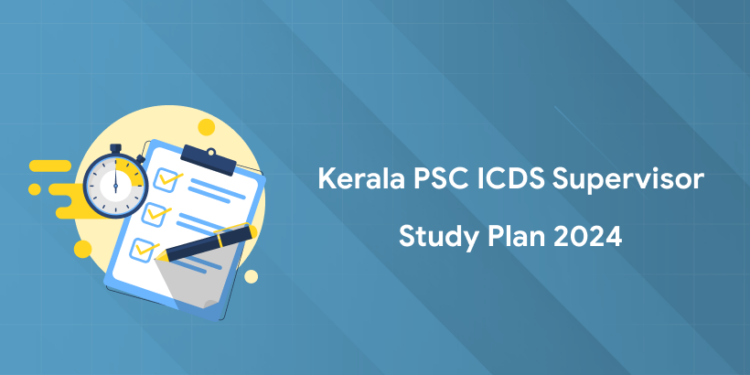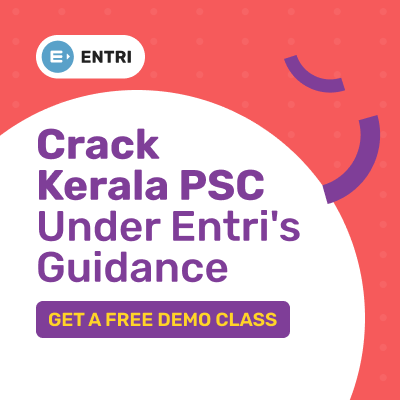Table of Contents
Are you getting ready for the Kerala Public Service Commission (KPSC) exam for ICDS Supervisors? With the announcement of Category Number 245/2023, it’s the perfect time to start preparing. A good study plan can help you succeed in this important exam. In this blog, we’ll share a simple study strategy, plan on managing your time, and useful resources. Let’s get started and help you achieve your goal!
ICDS SUPERVISOR ONLINE COACHING – FREE DEMO
30 Days Kerala PSC ICDS Study Plan 2024
The first step towards achieving high grades is to create a timeline for your preparations. Make an attempt to create one on your own, or use the study plans listed below. It’s all up to you. Don’t put too much pressure on yourself. As you work through the topics, jot down brief notes. Determine which topics carry the highest weight in terms of grades, and then allocate your study time accordingly.
Day Wise Table- Study Plan of 30 Days
| Days | Topics |
| Day 1 | Part 1: Home Science
Physiology and Microbiology Digestive system Cardio Vascular System and Reproductive system. Food Microbiology, food poisoning, food spoilage, food born infection. Diseases caused by Microorganism (a) Bacterial Pneumonia, Meningitis, Cholera, Syphilis, Diphtheria, Leprosy (b) Virus – AIDS, Rabies, German measles, Measles, mumps, polio mellitus (c) Amoebic dysentery, malaria |
| Day 2 | Child Development and Welfare
The neonates – Characteristics, abilities and adjustments, reflexes- agar test, neonatal care Immunization, – Breastfeeding Advantages. Importance of early stimulation Discipline and guidance for children, preschool education – objectives, types, pre-school personnel, preschool records. Child-rearing practices of parents, parental attitudes, and families influence the personality and behaviour development of children. Responsible parenthood (acceptance, injection and over protection) Population education definition problems of overpopulation, small family norm, family planning, sex education, STD. |
| Day 3 | Review your notes and try solving the previous year’s questions as many times as you can. |
| Day 4 | Human Nutrition and dietetics
Good Nutrition, Malnutrition, balanced diet, RDA, Carbohydrates, Proteins, Lipids, vitamins and minerals Classification, functions, Sources and deficiencies, dietary fibre, Diet in fevers, Diarrhoea, Pre-school and adolescents. Meal planning, Therapeutic nutrition Important National and International agencies. |
| Day 5 | Extension education and communication
Extension Education, definition, need principles, philosophy, difference between formal, informal and extension education. Community development – objectives, history of community development programmes in India, Poverty alleviation programmes in India. Programme development – Planning execution and evaluation. Communication methods, Audiovisual aids – classification |
| Day 6 | Basic food science
Food groups, cereals and cereal products, pulse and legumes, nuts and oil seeds, vegetables and fruits, milk and milk products, Meat, fish, egg and poultry, Beverages, spice and condiments – composition and nutrient value, selection of these foods and storage. |
| Day 7 |
|
| Day 8 | Part 2: Sociology
Family Nature, composition, characteristics, types. Patriarchal and matriarchal family Joint family, extended family, nuclear family, merits and demerits of joint family Disintegration of joint family in India, changing role of family, modern trends.
|
| Day 9 | Social Problems
Domestic violence, alcoholism, dowry, dowry deaths, legislations related to dowry drug addiction Child labour, child abuse, rights of children Violence against Women Problems of the elderly Social psychological and economic Social security measures Educated unemployment, and underemployment. |
| Day 10 |
|
| Day 11 | Developmental Issues
Poverty alleviation programmes, consumerism, rural-urban Disparities Environmental degradation- air pollution, water pollution, solid waste management, climatic change Problems of induced displacement- social, economic, and cultural problems of displaced people. |
| Day 12 | Women and Development
Women in governance, gender issues, empowerment of Women Participation of women in socio-political activities Women in panchayat raj Institutions, and the role of self-help groups in the socio-economic development of women. |
| Day 13 | Tools and Techniques of data collection
Primary and secondary data, Observation Participant and non-participant, interview schedule, questionnaire, structured and Unstructured, open and closed questions and case study method. |
| Day 14 |
|
| Day 15 | Part: 3
Social Work Developmental Psychology (Human Behaviour in Social Environment): Growth vs. development -developmental task (by Havighurst) – the biophysical, psychological and socio-cultural changes happening during life span – Prenatal, Early Childhood, Late Childhood, Puberty, Adolescence, Young Adulthood, Middle Adulthood and Old Age– Hazards |
| Day 16 | Developmental Welfare Needs across the Life Span:
Prenatal care -immunisation – breastfeeding – parenting – preschool education – sex education and menstrual hygiene – prevention of substance abuse – vocational guidance – premarital counselling – career guidance and planning – retirement planning– bereavement |
| Day 17 | Family Counselling:
Family as an Institution – dysfunctional families – Family Systems Theory – Enmeshment and Boundaries -Issues: separation, divorce, remarriage -Family Life Cycle: Independence, Coupling (marriage), Parenting: babies through adolescence, Launching adult children, Retirement – Family and Couple Therapy |
| Day 18 | Working with Groups:
Groups – Types of groups: in-groups, out-groups, primary, secondary and reference – Group Dynamics: dyads and triads, competition, conflict, cooperation and cohesion, coercion, accommodation – Stages of Group Formation -Social Group Work (working with groups) – social group work process (Intake, Study, Diagnosis, Programme Development, Implementation of the programme, Evaluation) |
| Day 19 | Reproductive Health & Family Planning:
Adolescent Sexual Health (ARSH) – Contraception: temporary and permanent methods – factors affecting fertility – Infertility -STIs & HIV/AIDS – Safe Motherhood and Responsible Parenthood – Population Pyramids -Unwanted Pregnancy & Medical Termination of Pregnancy Act. |
| Day 20 |
|
| Day 21 | Part 4: Psychology
Introduction to Psychology: Psychology approaches to psychology: structuralism-functionalism-behaviorism-Gestalt psychology. Biological – psychoanalytic -Humanistic – Cognitive approaches-methods in psychology observation- case study-survey and experimental methods.
|
| Day 22 | Biological basis of behaviour, Brain and Behaviour:
neuron structure of neuron synapse- neurotransmitters-CNS- Sensory and motor processing- cortical localization, localization of language, localization of perception.
|
| Day 23 | Sensation Perception and Consciousness:
Sensory thresholds subliminal perceptions colour perception-cues-Perception of form, pattern or objects figure and Ground-0 contour-perceptual constancies Size-shape- orientation-brightness-lllusions-type of illusions- ESP-states of consciousness-biological rhythms-dream and sleep-ASC meditation.
|
| Day 24 |
|
| Day 25 | Psychological Processes :
Learning: classical conditioning-operant conditioning cognitive learning-observational learning-Memory:
|
| Day 26 | Personality and Abnormal Behaviour:
Approaches to personality Major ideas of Freud’s theory- assessment of personality-self report projective measures-DSM-ICD classification-anxiety disorders-mood disorders- schizophrenia-personality disorders.
|
| Day 27 |
|
| Day 28 | Part 1: Home Science
Part 2: Sociology |
| Day 29 | Part: 3 Social Work
Part: 4 Psychology
|
| Day 30 |
|
Kerala PSC ICDS Supervisor Syllabus 2024 (Expected)
1: Which Year First Assembly Election was held in Kerala?
To create an effective study plan for the Kerala PSC ICDS Supervisor Exam, it’s important to know the syllabus. The exam typically covers subjects like General Knowledge, Current Affairs, and Child Development, along with topics related to the Integrated Child Development Services (ICDS) program. Familiarizing yourself with these areas will help you focus your studies and ensure you’re covering everything needed. Make sure to review the detailed syllabus from the official KPSC notification to understand the specific topics and subjects you need to study.
Download the ICDS Supervisor Syllabus PDF now!
Kerala PSC ICDS Supervisor Exam Pattern 2024 (Expected)
Knowing the structure of the paper helps the aspirants prepare well for the exam. So, make use of this data and get a good score in the exam.
- The mode of this exam is online (objective Multiple Choice).
- The maximum mark for this exam is 100.
- The medium of the exam is English.
- The duration of the exam is 1 hour 30 minutes.
- The questions are based on education qualification.
| Part | Name of the Subject | No. of Marks |
| Part I | Home Science | 25 marks |
| Part II | Sociology | 25 marks |
| Part III | Social Work | 25 marks |
| Part IV | Psychology | 25 marks |
| Total Marks | 100 Marks | |
Kerala PSC ICDS Supervisor Study Materials 2024
For the Kerala PSC ICDS Supervisor Exam, having the right study materials is crucial for your preparation. You can start with textbooks that cover Child Development, Nutrition, and Social Work. Additionally, refer to guides that focus on General Knowledge and Current Affairs, as these topics are important for the exam. Online resources, such as educational websites and video lectures, can also be very helpful. Joining study groups or forums can provide support and extra materials shared by fellow candidates. By using a mix of these resources, you’ll be well-prepared to tackle the exam confidently!
General Awareness Books
| Books | Publisher |
| Quantitative Aptitude for Competitive Examinations | R S Aggarwal |
| A Modern Approach To Logical Reasoning | R S Aggarwal |
| BlackBook of General Awareness January 2023 | Nikhil Gupta |
Basic Computer Knowledge Books
| Books | Publisher |
| 99 Reasoning & Computer Aptitude Topic-wise Previous Year Solved Papers for IBPS/ SBI/ RRB/ RBI Bank Clerk/ PO Prelim & Main Exams (2010 – 2023) 7th Edition | PYQs for all Bank Exams| | Disha Experts |
| Computer Awareness – A complete book on Computer Aptitude for All Competitive exams and College Freshers (English) | N K Gupta |
| Computer Knowledge for Competitive Exams | Dr. P.K. Pandey and Ms Shreya Pandey |
Mathematics Books
| Books | Publisher |
| Handbook of Mathematics | Arihant Experts |
| Arithmetic Subjective And Objective For Competitive Examinations | R S Aggarwal |
| Magical Book on Quicker Maths | M Tyra and K Kundan |
English Books
| Books | Publisher |
| English for Competitive Examination | Wren & Martin |
| S. Chand’s Objective General English for All Central & State Level Competitive Exams | ssc english book | ssc cgl english book | Fully Revised Video Edition Latest 2023 | Dr. R S Aggarwal |
How to Prepare an Effective Study Plan for the Kerala PSC ICDS Supervisor Exam
Make a schedule
Making a realistic, efficient study programme is one of the best strategies to prepare for competitive exams. Make a plan for each hour of the day, assigning a certain amount of time to each subject and topic, and finishing your task before going on. It is preferable to write out your study timetable and post it wherever you can see it. It will serve as a continual reminder of the tasks that must be completed each day.
Set up your study area
Before you sit down to study, arrange your desk. Choose a spot to sit that is cosy, quiet, has enough lighting, and has enough for your belongings. Turn off all distractions, put your phone away, and tidy up. Make sure your study area is tidy and well-planned. To save time, bring everything you’ll need, including practise sheets, textbooks, notes and stationery.
Revise and re-revise
The most important study strategy that can make or break your outcomes is revision. Your capacity to remember and retain material during the test is enhanced by revision. Of course, you can dedicate extra time to more in-depth subjects, but it’s best to go through the entire syllabus again and make sure nothing is overlooked. Every night before you go to bed, review everything you’ve learned. On the weekends, go over your entire week’s curriculum again.
Take refreshing study breaks
Effective study techniques require studying in short bursts interspersed with frequent, rejuvenating study breaks, as opposed to protracted, drawn-out study sessions. You can study for extended periods of time without growing weary of it. Additionally, a brief rest after an intense study session gives your brain adequate time to better retain the knowledge. Consequently, after every 25-minute study session, take a quick 5-minute break, and after every two hours, take a longer 15-minute break. During this time, do something useful to refuel your body and mind for the next session.
Make your own SMART notes
It is not sufficient to just study and reread material in order to pass highly difficult exams. Creating smart notes in your native tongue is an intelligent learning strategy. To help you understand the material better, jot down brief summaries and make flashcards, mind maps, flowcharts, diagrams, bullet points, etc. Use flashcards for equations and key formulas, and carry them about with you to review them anytime you have some free time.
Set realistic study goals every day
Becoming eligible for competitive tests takes time. Attaining your objectives requires a sustained effort, diligence, and efficient study techniques over an extended period of time. As a result, you need to make sure you meet your daily goals for studying each subject before you retire.
Ask for help
Finally, don’t be afraid to contact your lecturers or mentors for assistance if you are having trouble understanding a topic, equation, number, or concept. Ignoring your doubts will cost you the entire year. As a result, seek advice and assistance whenever you need it.
Tips for Preparing for the Kerala PSC ICDS Supervisor Exam 2024
- Understand the Syllabus: Familiarize yourself with the topics you need to study, like Child Development and General Knowledge.
- Create a Study Schedule: Set aside specific times each day for studying to stay organized and focused.
- Use Good Study Materials: Gather textbooks, guides, and online resources that cover the exam topics.
- Practice with Previous Papers: Solve past exam papers to get a feel for the question format and improve your timing.
- Stay Updated on Current Affairs: Read newspapers or follow news apps to stay informed about important events.
- Take Regular Breaks: Don’t forget to rest your mind. Short breaks can help you stay fresh and focused.
-
Join Study Groups: Studying with others can help you learn better and stay motivated.
Kerala PSC ICDS Supervisor Study Plan 2024: FAQs
Q1: What is the minimum age requirement to apply for the Kerala Anganwadi Jobs 2023?
Ans: The lowest age requirement for applicants to the SJD Kerala Anganwadi Recruitment is eighteen years old, while the maximum age limit is forty years old. The age reduction will take place in accordance with government regulations.
Q2: What are the Kerala Anganwadi Bharti 2023 Eligibility Requirements?
Ans: A large number of applicants live in the state of Kerala and are hoping to be selected for the Kerala Anganwadi Worker, Helper, and Supervisor Vacancy. You need to have your 08th, 10th, and 12th certificates in order to apply for these positions.
Q3: What credentials are required of an ICDS supervisor in Kerala?
Ans: (1) A recognised university degree in psychology, home science, sociology/social work, OR (2) a recognised university graduation with a child servant training certificate.
| Kerala PSC ICDS Exam Information Links | |
| Kerala PSC ICDS Notification | Kerala PSC ICDS Mock Test |
| Kerala PSC ICDS Syllabus | Kerala PSC ICDS Previous Questions |
| Kerala PSC ICDS Exam Date | Kerala PSC ICDS Study Materials |
| Kerala PSC ICDS Application Form | Kerala PSC ICDS Interview Questions |
| Kerala PSC ICDS Vacancy | Kerala PSC ICDS Job Profile |
| Kerala PSC ICDS Admit Card | Kerala PSC ICDS Salary |
| Kerala PSC ICDS Answer Key | Kerala PSC ICDS Preparation Tips |
| Kerala PSC ICDS Best Books | Kerala PSC ICDS Result |
| Kerala PSC ICDS Eligibility Criteria | Kerala PSC ICDS Cut Off |
| Kerala PSC ICDS Selection Process | Kerala PSC ICDS Exam Analysis |











